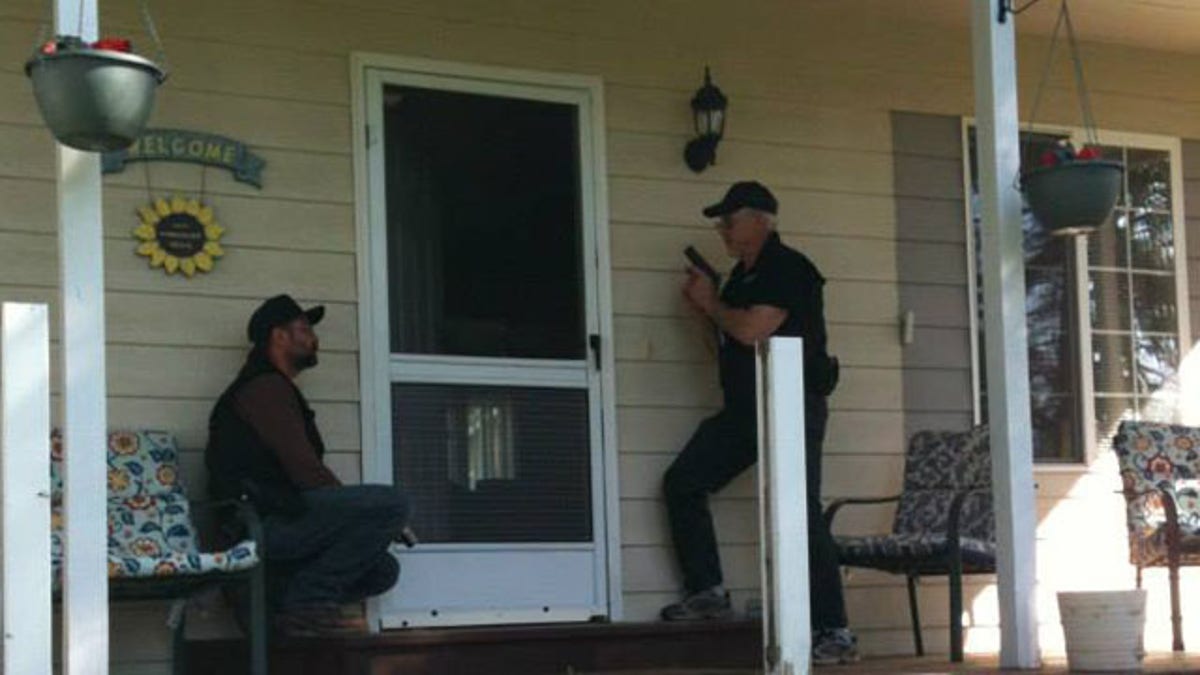
North Valley Community watch members prepare to check on a home. (north valley community watch)
When budget woes reduced the sheriff's department in one rural Oregon county to a bare-bones force, residents decided to take matters into their own hands -- creating armed patrol groups in defiance of local officials.
Their decision has raised safety concerns with the county government, which would prefer residents instead hike their own taxes to fund the hiring of trained deputies. But despite the risks, the move stands as a unique, some would say innovative, response to one of the country's most severe local budget crunches.
The government in Josephine County, where nearly 70 percent of the land is owned by the U.S. government, had long relied on federal timber subsidies to pay the bills. When the feds terminated the funds, county officials scrambled to pass a May 2012 tax levy to make up a nearly $7.5 million budget shortfall.
However, the county's residents voted against the levy, and as a result the Josephine County Sheriff’s Office was gutted. The major crimes unit closed, dozens of prisoners were released from the county jail and the department reduced operations to Monday-Friday, eight hours a day.
The Sheriff’s Office then issued a press release announcing their deputies would only be responding to what they deemed “life-threatening situations.”
Ken Selig -- who was the longest-serving law enforcement officer in all three local agencies when he was forced to retire from the department due to cuts -- told FoxNews.com he found the sheriff’s declaration unacceptable. And he felt compelled to guard his community’s vulnerable members.
“Who else is going to protect you when your government can't?” Selig said.
Selig and his friend Pete Scaglione formed the North Valley Community Watch, a county-wide organization dedicated to helping citizens in non-life-threatening situations, primarily property crimes. It is one of a handful of community groups that have formed since the cuts. Without a robust Sheriff's Office, their mission is broader than the typical neighborhood watch group.
Not only did the Sheriff's Office narrow its scope to "life-threatening" situations, but it even encouraged people who felt unsafe to relocate. “... the Sheriff's Office regretfully advises that, if you know you are in a potentially volatile situation (for example, you are a protected person in a restraining order that you believe the respondent may violate), you may want to consider relocating to an area with adequate law enforcement services,” the original release stated.
Selig's community watch group, looking to fill in the law enforcement cracks, now meets once a month to discuss crime and teach its approximately 100 members about personal safety. The group also has a trained “response team,” which consists of 12 people who will respond to the scene of a reported non-life-threatening situation if called.
Though the “response team” members do carry legal firearms, Selig said the team’s main goal is to provide a deterrent presence, and that none of them have ever fired a shot. He said those involved in his group believe there is no substitute for well-trained law enforcement, but they feel they have no other choice but to protect their community.
“We believe responsible citizens doing responsible things make it hard for criminals to do irresponsible things,” he said.
Selig believes politics are behind the county government’s decision to not funnel what funds they do have toward law enforcement. He says the county government seems to be pressuring the citizens to pass an additional tax hike they cannot afford.
“The key is to get the funding somewhere where the local people can get the services they need,” Selig said.
However, Josephine County Commissioner Keith Heck said residents of the county that opposed the tax levy need to realize there is no fat to cut.
Heck said the county has tried to live within the bounds of its fiscal realities, but citizens need to realize the options for paying for law enforcement are limited. "The county coffers are at the bottom of the barrel," he said.
Heck said though he supports neighborhood watch groups and citizens being vigilant in their community, the rise of increasingly “aggressive” community watch groups make him worried the situation could escalate to violence. Watch groups have been under increasing scrutiny nationally ever since the George Zimmerman case in Florida.
“These things seem good on the PR side but fail a little in the reality side,” Heck said.
Heck said the only real solution is for the county citizens to approve more funds.
“There is this little shimmer out there of some giant Santa that is going to come and drop all this money on us because we are well-meaning folks,” he said. “The sleigh is broken, the deer are dead, it’s not going to happen. We have to figure out how we are going to solve this problem.”




